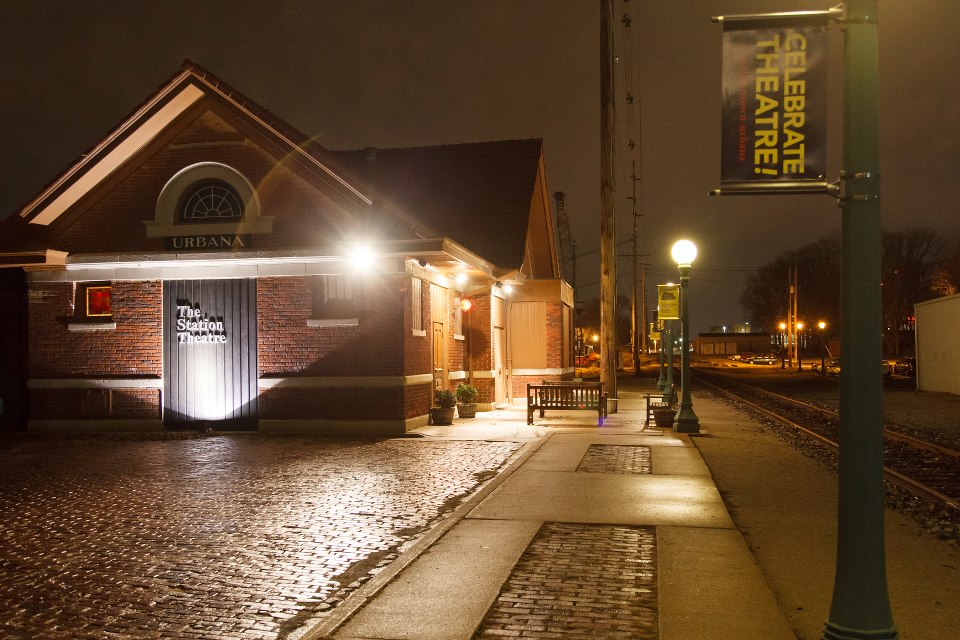I have just face-planted on the gravel near the railroad tracks outside the Station Theatre in Urbana. Someone asks if I am alright, but I am too busy loudly groaning, “FUUUUUCK ME” to answer. He proceeds inside to get his tickets for that night’s  performance of the musical, Next to Normal. It’s been raining and raining and raining, and it starts to rain again on me as I lie there, rolling over on my back in the gravel cursing my poor sense of balance. I was rushing in because I had to do an emergency cookie run because we’ve run out of intermission cookies and the patrons do like their cookies so … I am groaning in the gravel, looking up at a godless sky and trying to figure out if I am okay as I shout, “I think I’m fine.” No one hears. They have trundled inside to get their tickets and avoid the rain. If I die here, maybe River Phoenix and his gang will find my body and carry me home. But River’s dead now so if I die too, maybe we’ll date and later marry. Maybe we’ll have angelic babies with his hippie hair and dreamy green eyes and my ability to avoid heroin and other hard drugs that aren’t administered by a respectable physician or psychologist… But then I’ll need an angelic uterus, and I hear those are hard to come by… Clearly I am delirious from the fall. I need to snap out of it and get up before I drown. I rise from the gravel with more than a little effort and a lot more swearing only to realize I’ve sprained my right ankle and hit the rotator cuff I had major surgery on two years ago, but I really don’t care. The cookies are unscathed and that’s the important thing. I hobble into the lobby, drop the cookies at the coffee station, and expect a hero’s welcome. But it’s a sold-out night and the extra chairs need arranged, and all are too busy to hear my tale of woe and self-sacrifice, so I sit in my lobby chair and pout. Thus ends my first ten months at the Station Theatre, and I really love it.
performance of the musical, Next to Normal. It’s been raining and raining and raining, and it starts to rain again on me as I lie there, rolling over on my back in the gravel cursing my poor sense of balance. I was rushing in because I had to do an emergency cookie run because we’ve run out of intermission cookies and the patrons do like their cookies so … I am groaning in the gravel, looking up at a godless sky and trying to figure out if I am okay as I shout, “I think I’m fine.” No one hears. They have trundled inside to get their tickets and avoid the rain. If I die here, maybe River Phoenix and his gang will find my body and carry me home. But River’s dead now so if I die too, maybe we’ll date and later marry. Maybe we’ll have angelic babies with his hippie hair and dreamy green eyes and my ability to avoid heroin and other hard drugs that aren’t administered by a respectable physician or psychologist… But then I’ll need an angelic uterus, and I hear those are hard to come by… Clearly I am delirious from the fall. I need to snap out of it and get up before I drown. I rise from the gravel with more than a little effort and a lot more swearing only to realize I’ve sprained my right ankle and hit the rotator cuff I had major surgery on two years ago, but I really don’t care. The cookies are unscathed and that’s the important thing. I hobble into the lobby, drop the cookies at the coffee station, and expect a hero’s welcome. But it’s a sold-out night and the extra chairs need arranged, and all are too busy to hear my tale of woe and self-sacrifice, so I sit in my lobby chair and pout. Thus ends my first ten months at the Station Theatre, and I really love it.
Clearly, I’m a little crazy, but my desire to be involved in the Station comes from years of longing. Back in my past life, I would venture up from Charleston, Illinois for a bit of culture and some mall-shopping. Sure, Charleston, or more precisely Mattoon, had a mall, but it was not like Market Place Mall and Lincoln Square Mall, THE BEST MALLS EVER! Cut me some slack; it was the eighties, and I was a sheltered child. Anyway, I was also involved in theatre down there and every so often would venture up to see a play or musical at the Station. Theatre has always transported me, sent me away from a life that was … lacking is the most consistent adjective. But there were a few times, when attending a show, that I actually felt like I was touching God. I had left my body and my worldly concerns and had seen God’s face, and it was really bitchin’ theatre! In professional theatre, it was Steppenwolf’s production of Take Me Out, or the touring company of Spring Awakening, or the ACT of San Francisco’s production of Edward Albee’s The Goat, or Who is Sylvia? But back in 1995, I attended a Station Theatre production of Brad Fraser’s play, Unidentified Human Remains and the True Nature of Love and … my brain exploded. Here was an intelligent and beautifully mounted production of a play that dealt honestly with sex and sexuality and relationships and didn’t take prisoners. It dealt with all forms of sex and love: straight, gay, and bi; sweet and loving, and cruel and violent, and it was honest and it made you think. There were nude scenes performed as written that made sense, and sex scenes performed as written that were hard to watch and dripping with reality and a bit of sweat. The actors in this production were giving true-to-life emotional performances and … I was hooked! This was the theatre I wanted to mainline, and I didn’t care if I overdosed ‘cause it was better than anything I had ever seen before in my life! Fuck Oklahoma; this was theatre!
Fast forward through me moving here, losing confidence in my abilities to truly compete in the local theatre scene, getting mentored at Parkland College Theatre by the lovely Randi Jennifer Collins Hard and learning how to direct. It was awkward and messy and I loved it, and Randi gave me a freedom to experiment with actors in front of an audience that I will always be grateful for because it made me learn the importance of respecting actors and production staffs and trusting the text. When she retired, I felt certain of two things: The current political climate makes it very difficult to do honest meaningful theatre or art that delves into real issues at a publicly funded institution without fear of funding cuts or other bad things, and that I was ready to spread my wings and venture into a venue that has a primary focus on serious art. With the lessons I’d learned at Parkland, I proposed Paula Vogel’s How I Learned to Drive, and surprise of surprises, the selection committee chose it to begin the 2012–13 Season. Ummmm, seriously … HOLY SHIT, NOW WHAT?
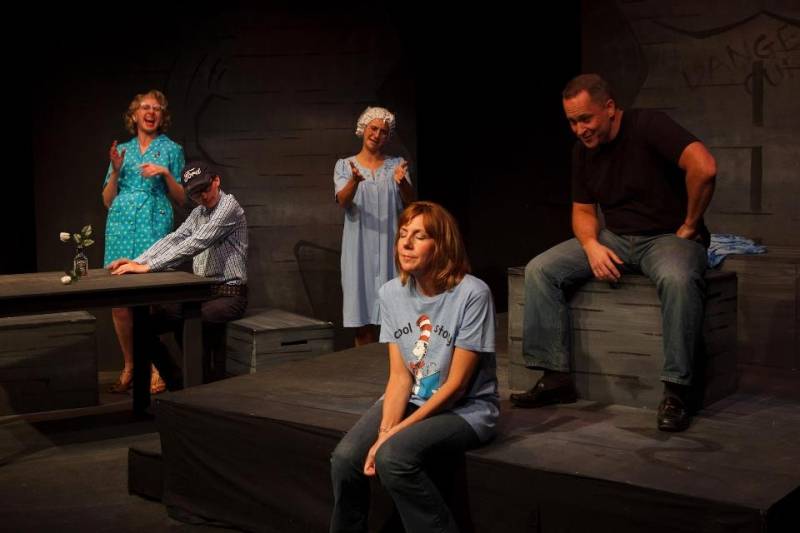
Now, How I Learned to Drive is one of my bucket list plays, and I had the chance to do it the way I’ve always envisioned it in my head. That is a rare gift for any director. And true to any director who’s received such a gift, I started to panic a little because what if I couldn’t make what was in my head come to life on their stage? What if I couldn’t find actors to work with me? What if I choked and the show sucked? Then I saw the budget and the real sweating began because having a budget and a full staff at your disposal is definitely one key advantage of doing theatre in academia. But all those production dollars come with more and more strings in our current political climate, and I can only do “family-friendly” so many times before I am tempted to go on a machete rampage. So I took a deep breath, inhaled a bottle or two of vodka and told myself that my goal was to give the Station a production that looked like it cost far more than it did.
My reputation as a director up to this point had been that, while my plays might be a bit confusing and frustrating to interpret, they looked really good! The creative process of How I Learned to Drive was both terrifying and exhilarating. I was working with a new production team who actually listened to everything I rambled about while discussing “my concept,” and we were able to turn the performance space into sort of the recesses of the protagonist’s damaged and fragile psyche, all grey and spooky and wonderfully lit. (Thanks Moon and Jesse!) My cast was truly a wonder to work with. (Thanks Chris, Thom, Malia, Sarah, and Nic!) Each actor committed to the dark and unnerving world of Vogel’s play and brought a depth and honesty that I am still moved by. Ultimately, this is a play about child abuse and the unnervingly blurry line between love and abuse. Its honesty and moral ambivalence are the reasons I love the piece, but it’s a hard sell to your average audience member and many theatres as well. What I learned from this experience is: If you mount an honest and thoughtful production with great people, your audiences may be smaller, but they will be faithful and moved and make it all worth it. This was one of the most challenging and rewarding experiences of my life, and I am still pinching myself that I was able to do this in such a supportive environment.
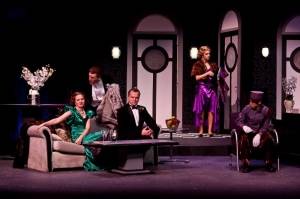 Another challenge this year has been going from dabbling in costuming to being a real life costumer. I had taken more and more control of the costuming of my pieces because I think costumes should always make a statement. In Parkland’s production of Lend Me a Tenor, I was able to chose a bold color palate and assist my costumer in choosing patterns and looks. In Duck Hunter Shoots Angel and Dead Man’s Cell Phone, I took a more active role in choosing and researching the looks with the solid support of an experienced costumer. (Thanks Randi!) My first maiden voyage as a costumer was
Another challenge this year has been going from dabbling in costuming to being a real life costumer. I had taken more and more control of the costuming of my pieces because I think costumes should always make a statement. In Parkland’s production of Lend Me a Tenor, I was able to chose a bold color palate and assist my costumer in choosing patterns and looks. In Duck Hunter Shoots Angel and Dead Man’s Cell Phone, I took a more active role in choosing and researching the looks with the solid support of an experienced costumer. (Thanks Randi!) My first maiden voyage as a costumer was 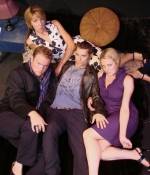 for the Station’s summer production of Douglas Carter Beane’s The Little Dog Laughed, a position I basically stalked until the director relented for fear of me doing him bodily harm, and he let me costume it. (Thanks Mathew!) The challenges of a tight budget and glamorous clothing were daunting, but rewarding. The fact that nude scenes necessitate that you have to consult with actors about their personal grooming was unique (Thanks Rob and Casey!), but through all of this, I learned that I loved it and wanted to do more of it.
for the Station’s summer production of Douglas Carter Beane’s The Little Dog Laughed, a position I basically stalked until the director relented for fear of me doing him bodily harm, and he let me costume it. (Thanks Mathew!) The challenges of a tight budget and glamorous clothing were daunting, but rewarding. The fact that nude scenes necessitate that you have to consult with actors about their personal grooming was unique (Thanks Rob and Casey!), but through all of this, I learned that I loved it and wanted to do more of it.
And this is the year when wishes come true! This season I have costumed one production at the Armory Free Theatre (The Wild Party) and four of the eight shows in the Station’s main season (How I Learned to Drive, Bloody, Bloody Andrew Jackson, Sons of the Prophet, and our current production of Next to Normal). That’s since mid-November. I do not sleep. EVER! Each costuming job has had its joys (rummaging through the vaults at Krannert for 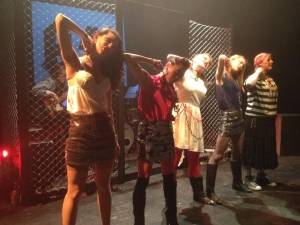 Party, going crazy with iconic rocker fashions in Bloody, playing with color-wheel psychosis in Normal) and challenges (mainly having to control my abiding love of bold color and sparkly things). One of my main professional influences in costuming is Ann Roth, the award-winning film costumer of such films as Closer, Rabbit Hole, The Hours, Angels in America, and Extremely Loud and Incredibly Close, and the HBO miniseries of Mildred Pierce. Her attention to detail and ability to define a character with a piece of clothing or accessory is what I hope to bring to my future productions at the Station.
Party, going crazy with iconic rocker fashions in Bloody, playing with color-wheel psychosis in Normal) and challenges (mainly having to control my abiding love of bold color and sparkly things). One of my main professional influences in costuming is Ann Roth, the award-winning film costumer of such films as Closer, Rabbit Hole, The Hours, Angels in America, and Extremely Loud and Incredibly Close, and the HBO miniseries of Mildred Pierce. Her attention to detail and ability to define a character with a piece of clothing or accessory is what I hope to bring to my future productions at the Station.
Okay, so back to the gravel. It is the end of my first regular season at the Station, and I am now a board member and a new co-producer for the company. The cookies and coffee and trash collection and shopping for staples and creating programs and marquees and finding staffs have been my recreational focus for the past eight weeks. It has been challenging, and I am not sure how good I am at this new role yet, but I do love it. Listen, we all have our hobbies. My mother crocheted and sewed many of her own clothes, my ex judged me whenever possible, and my father drank. Hobbies are a personal choice and come from a love of a particular activity or pastime. If you do them right, they enrich your lives. There are easier and less time-consuming hobbies than diving into theatre, and while lying in the gravel wondering if I’ve broken my ankle, I think, “Dad was smart. Drinking is simpler.” But then I realize my liver is far healthier than his was, and I pull myself up off the gravel and run to the next challenge, in this case directing Tracy Letts’ wonderful play Superior Donuts, the first production of the Station’s summer theatre.








